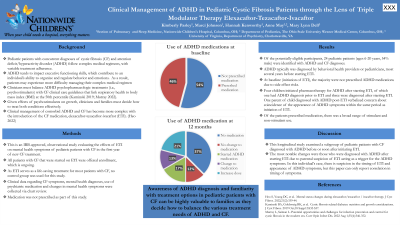Child and Adolescent Psychiatry
Session: Poster Session
(035) Clinical Management of ADHD in Pediatric Cystic Fibrosis through the Lens of Triple Modulator Therapy Evacaftor-Tezacaftor-Ivacaftor

Trainee Involvement: No

Mary Lynn Dell, MD, DMin, MHA (she/her/hers)
Professor of Psychiatry & Neurobehavioral Sciences
University of Virginia
Richmond, Virginia, United States- KP
Kimberly E. Pasley, PsyD
Mental Health Coordinator
Nationwide Children's Hospital
Columbus, Ohio, United States 
Marci Johnson, LISW-S
Mental Health Coordinator
Nationwide Children's Hospital
Columbus, Ohio, United States- HK
Hannah Kenworthy, BS
Clinical Research Coordinator
Nationwide Children's Hospital
Columbus, Ohio, United States 
Anne May, MD
Associate Professor of Clinical Pediatrics
Nationwide Children's Hospital
Columbus, Ohio, United States
Presenting Author(s)
Co-Author(s)
Pediatric patients with concurrent diagnoses of cystic fibrosis (CF) and attention deficit/hyperactivity disorder (ADHD) follow complex medical regimens, with variable treatment adherence. Clinicians must balance ADHD psychopharmacologic treatments (i.e., psychostimulants) with CF clinical care guidelines that link respiratory health to body mass index (BMI) at the 50th percentile (Kaminski 2019; Murray 2022). Given effects of psychostimulants on growth, clinicians and families must decide how to treat both conditions effectively. Clinical management of comorbid ADHD and CF has become more complex with the introduction of the CF medication, elexacaftor-tezacaftor-ivacaftor (ETI). (Heo 2022) This 5-year study is an IRB-approved, observational study evaluating the effects of ETI on mental health symptoms of pediatric patients with CF in the first year of new CF treatment. All participants (6-20 years) started on ETI were offered enrollment, which is ongoing. As ETI serves as a life-saving treatment for most patients with CF, no control group was used for this study. Clinical data regarding CF symptoms, mental health diagnoses, use of psychiatric medication and changes in mental health symptoms were collected via chart review. Medication was not prescribed as part of this study. Upon chart review, twenty-four pediatric patients (54% male) were identified with confirmed diagnoses of ADHD and CF. ADHD typically was diagnosed by behavioral health providers or pediatricians, most several years before starting ETI. At baseline (initiation of ETI), the majority were prescribed no ADHD medications due to side effect risk. Four children initiated pharmacotherapy for ADHD after starting ETI, of which one had ADHD diagnosis prior to ETI and three were diagnosed after starting ETI. One parent of child diagnosed with ADHD post-ETI verbalized concern about coincidence of the appearance of ADHD symptoms within the same period as initiation of ETI. Additionally, 11 changed, increased their dose, or initiated treatment within the first year of starting ETI. Three experienced no changes to their treatment plan. Of the patients prescribed medication, there was a broad range of stimulant and non-stimulant use. This longitudinal study examined a subgroup of pediatric patients with CF diagnosed with ADHD before or soon after initiating ETI. The most notable findings involved: 1) children who required ADHD medication changes due to possible ETI side effects; and 2) concern that ETI initiation triggered ADHD symptoms. Further studies are needed to track the qualitative changes observed in ADHD symptoms and guide treatment protocols for these complicated patients. Heo S, Young DC, et al. Mental status changes during elexacaftor/tezacaftor / ivacaftor therapy. J Cyst Fibros. 2022;21(2):339-44. Kaminski BA, Goldsweig BK, et al. Cystic fibrosis related diabetes: nutrition and growth considerations. J Cyst Fibros. 2019 Oct;18 Suppl 2:S32-S37.
Background:
Methods:
Results:
Discussion:
Conclusion: Awareness of ADHD diagnosis and familiarity with treatment options in pediatric patients with CF can be highly valuable to families as they decide how to balance the various treatment needs of ADHD and CF.
References:

